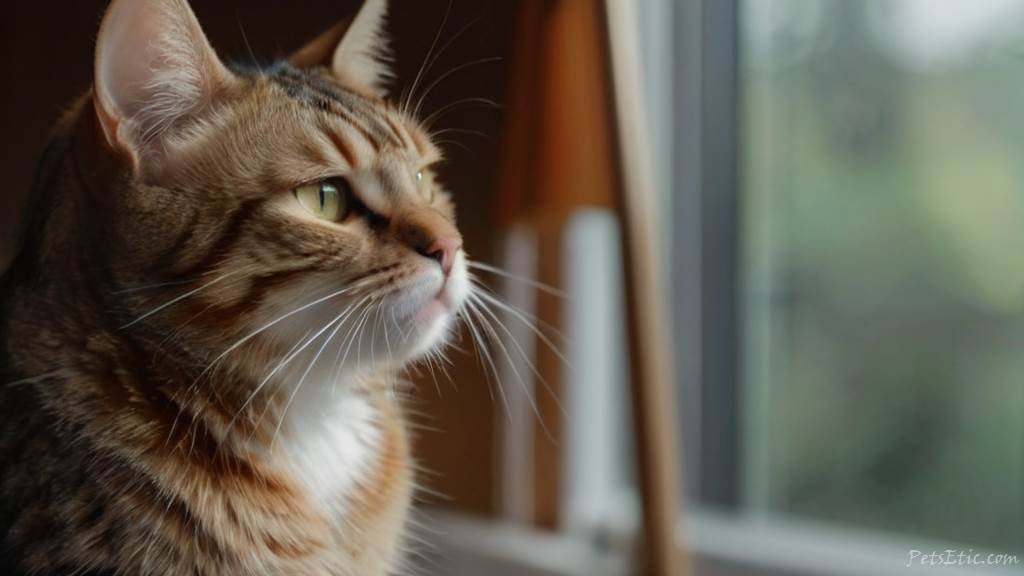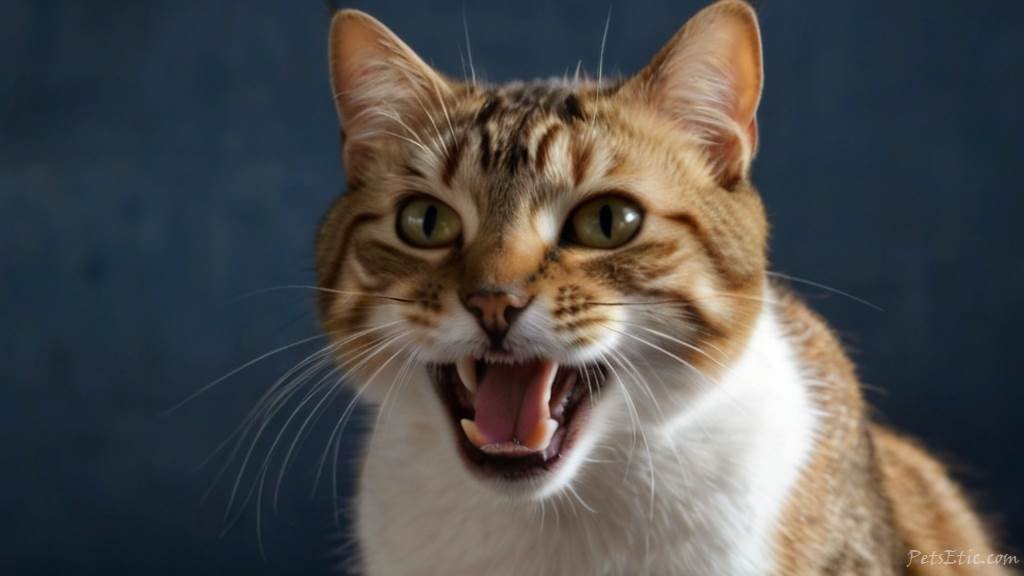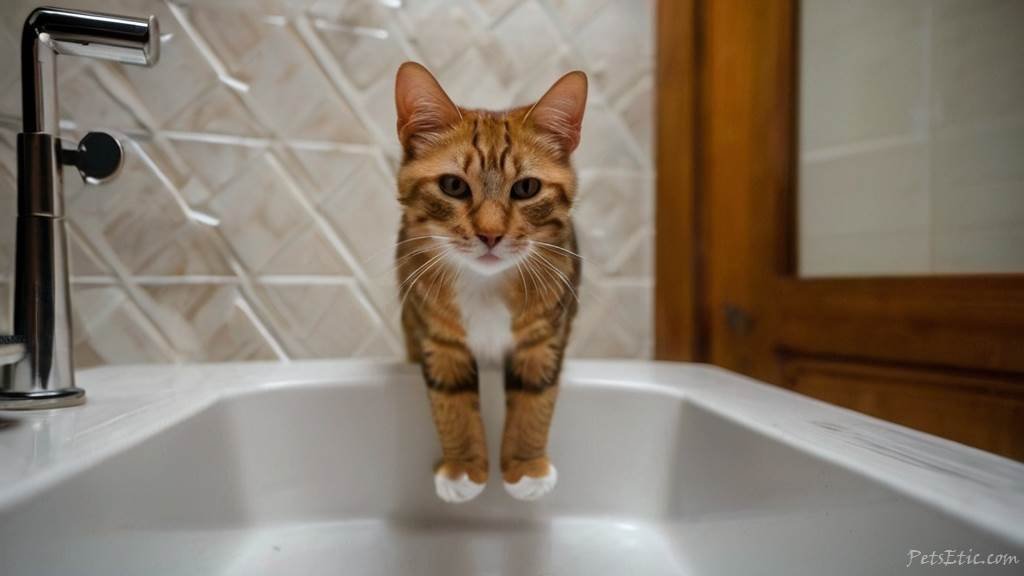Introduction to Cat Growling in Sleep
Cats, those enigmatic creatures who share our homes and hearts, often display behaviors that can leave us scratching our heads. One such puzzling behavior is growling in their sleep. You might have been there, snuggled up in bed, only to be jolted awake by the sound of your feline friend emitting low, rumbling growls while seemingly lost in dreamland. What’s going on? Let’s delve into this curious phenomenon and uncover the mysteries behind why cats growl in their sleep.
Contents
ToggleUnderstanding the Phenomenon
Picture this: your cat, curled up in a cozy ball, whiskers twitching and paws paddling as they drift off into dreamland. Suddenly, amidst the tranquility of the night, you hear it – a low, guttural growl emanating from your slumbering pet. It’s a puzzling sight, to say the least.
But fear not, for this behavior isn’t as ominous as it may seem. Cats, like humans, go through various stages of sleep, including the rapid eye movement (REM) phase where dreams occur. During REM sleep, cats may exhibit various behaviors, including twitching, vocalizations, and yes, even growling.
Importance of Addressing Unusual Cat Behaviors
Now, you might be thinking, “It’s just a little growling, what’s the harm?” While it’s true that occasional growling during sleep might not be cause for immediate concern, it’s essential to pay attention to your cat’s behavior, especially if it deviates from their usual patterns.
Unusual behaviors, such as excessive growling or other vocalizations during sleep, could be indicative of underlying issues that warrant further investigation. By understanding why cats growl in their sleep, we can better address any potential problems and ensure the well-being of our beloved feline companions.
So, why exactly do cats growl in their sleep? Let’s explore five possible reasons behind this intriguing behavior.

Exploring the Natural Behavior of Cats
Normal Sleeping Patterns of Cats
Ever wondered why your cat seems to snooze for the better part of the day? Well, it turns out that cats are natural-born nappers, with an average of 12 to 16 hours of sleep per day. But don’t be fooled by their seemingly lazy demeanor – cats are expert hunters, and all that sleep is crucial for conserving energy for their next adventure.
Cats are crepuscular creatures, meaning they are most active during the twilight hours of dawn and dusk. This nocturnal inclination is rooted in their evolutionary history, as their wild ancestors were primarily active during these times to avoid larger predators and hunt small prey under the cover of darkness.
So, what does a typical day in the life of a cat look like? Well, it usually starts with a few hours of morning activity, followed by a midday siesta to recharge their batteries. After that, it’s back to exploring, hunting imaginary prey, and perhaps a little more shut-eye before bedtime.
Characteristics of REM Sleep in Felines
Just like humans, cats experience different stages of sleep, including the elusive rapid eye movement (REM) phase. During REM sleep, cats may exhibit a range of behaviors, from twitching whiskers to full-blown vocalizations and, yes, even growling.
REM sleep is a crucial stage of the sleep cycle where dreams occur. It’s characterized by rapid eye movements, increased brain activity, and muscle paralysis – a built-in safety mechanism to prevent cats from acting out their dreams and potentially injuring themselves or others.
But what exactly do cats dream about? Well, that’s a question that scientists are still trying to answer. Some believe that cats dream about familiar activities, such as hunting or playing, while others speculate that their dreams may be influenced by past experiences or even their current environment.
Regardless of what they dream about, one thing is for sure – watching your cat sleep can be a fascinating glimpse into their inner world. So, the next time you catch your furry friend growling or twitching in their sleep, just remember that they’re probably just chasing imaginary mice in dreamland.

Why is my cat growling in its sleep?
Potential Reasons Behind Cat Growling During Sleep
Curled up in a cozy ball of fur, whiskers twitching, your cat seems to be enjoying a peaceful slumber – until suddenly, you hear it. A low, rumbling growl emanates from your sleeping feline, leaving you wondering what could possibly be causing such an unusual sound.
So, why is your cat growling in its sleep? Let’s explore some potential reasons behind this curious behavior.
-
Dreaming Felines: Much like humans, cats experience different stages of sleep, including the rapid eye movement (REM) phase where dreams occur. During REM sleep, cats may exhibit various behaviors, such as twitching whiskers, kicking legs, and yes, even growling. It’s believed that these vocalizations are a manifestation of their dreams, perhaps a reflection of their instinctual hunting behaviors or past experiences.
-
Reacting to External Stimuli: Despite being fast asleep, cats are still attuned to their surroundings. It’s possible that your cat’s growling in its sleep is a reaction to external stimuli, such as unfamiliar noises or scents. Even in their dreams, cats remain vigilant, ready to defend their territory from potential threats – real or imagined.
-
Physiological Factors: Sometimes, cat growling during sleep can be attributed to physiological factors. Pain or discomfort, such as arthritis or dental issues, may cause cats to vocalize, even in their sleep. Additionally, underlying health conditions, such as neurological disorders or hormonal imbalances, could also contribute to this behavior. If you notice your cat growling frequently during sleep, it’s essential to consult with a veterinarian to rule out any potential medical concerns.
Behavioral and Physiological Factors Influencing Sleep Behavior
When it comes to understanding why cats growl in their sleep, it’s essential to consider both behavioral and physiological factors.
-
Behavioral Triggers: Cats are creatures of habit, and their behavior is often influenced by their environment and past experiences. Stress, anxiety, or fear can manifest in various ways, including vocalizations during sleep. If your cat has experienced trauma or is adjusting to a new living situation, they may be more prone to growling during sleep as their subconscious processes these emotions.
-
Physiological Influences: Age, health status, and breed can all play a role in a cat’s sleep behavior. Senior cats may experience age-related ailments that disrupt their sleep patterns, while certain breeds are more predisposed to specific health issues. Understanding your cat’s unique needs and tendencies can help you better address any potential factors contributing to their growling during sleep.
In conclusion, while cat growling in sleep may initially seem perplexing, it’s often a natural and harmless behavior. By considering potential reasons behind this phenomenon, such as dreaming, reacting to external stimuli, and physiological factors, you can better understand and address your cat’s sleep behavior. However, if you have concerns about your cat’s health or behavior, don’t hesitate to seek guidance from a veterinarian.
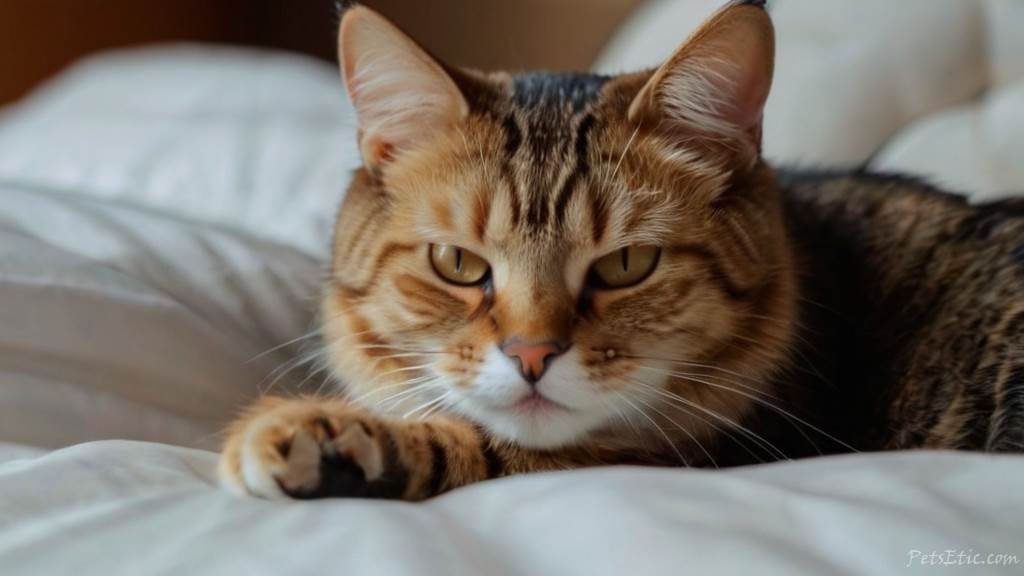
Should I wake my growling cat?
Understanding the Implications of Waking a Sleeping Cat
You’re snuggled up in bed, enjoying a peaceful night’s sleep when suddenly, you hear it – a low, rumbling growl coming from your cat. Your first instinct may be to wake them up, but before you do, it’s essential to understand the implications of disturbing your feline friend’s slumber.
-
Startling Effect: Waking a sleeping cat abruptly can be startling for both you and your furry companion. Just imagine how you’d feel if someone suddenly shook you awake from a deep sleep! Cats are creatures of routine and can become stressed or agitated if their sleep is interrupted unexpectedly.
-
Potential Aggression: Growling is often a sign of discomfort or perceived threat, even in sleep. If your cat is growling, it’s essential to approach them with caution, as they may lash out defensively when startled awake. This can put both you and your cat at risk of injury.
-
Disruption of Sleep Cycle: Cats, like humans, go through various stages of sleep, including the important rapid eye movement (REM) phase where dreams occur. Waking a cat during REM sleep can disrupt their sleep cycle and leave them feeling groggy or disoriented upon waking.
Best Practices for Handling Growling Episodes During Sleep
While it’s natural to be concerned when your cat is growling in its sleep, there are some best practices you can follow to ensure both your safety and your cat’s well-being.
-
Assess the Situation: Before intervening, take a moment to assess the situation. Is your cat in a safe and comfortable environment? Are there any potential sources of stress or discomfort nearby? Understanding the context of your cat’s growling can help you determine the best course of action.
-
Approach with Caution: If you decide to wake your growling cat, do so with caution. Approach them slowly and gently, using soothing tones to reassure them. Avoid sudden movements or loud noises, as these can escalate the situation and cause your cat to become more agitated.
-
Provide Comfort: Once your cat is awake, offer them reassurance and comfort. Spend some time petting and cuddling them to help them feel secure and relaxed. If your cat continues to exhibit signs of distress, such as pacing or hiding, consider consulting with a veterinarian to address any underlying issues.
In conclusion, while it can be concerning to hear your cat growling in its sleep, it’s essential to approach the situation with care and caution. Understanding the implications of waking a sleeping cat and following best practices for handling growling episodes can help ensure the safety and well-being of both you and your feline companion.
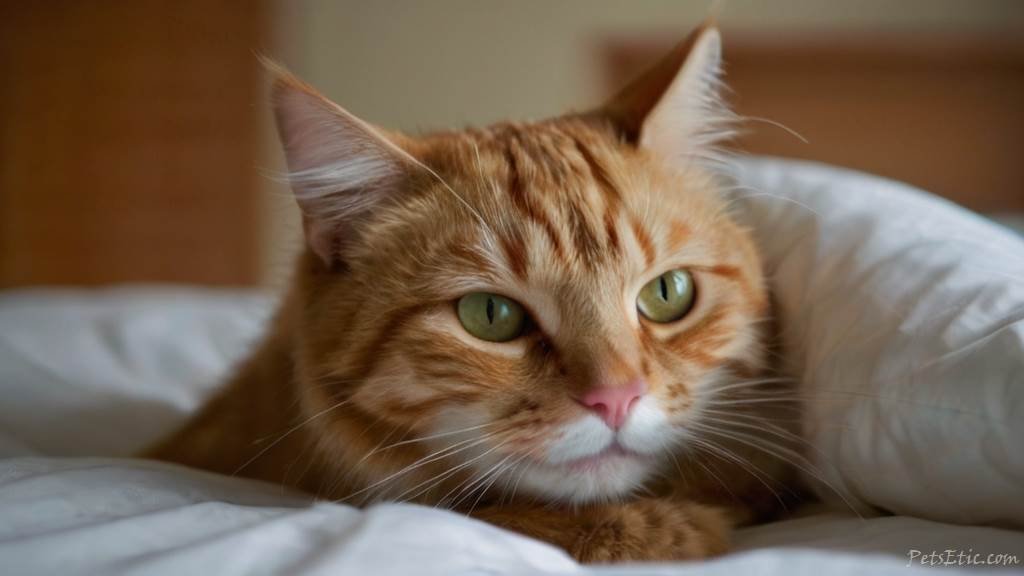
Is it normal for cats to growl in their sleep?
Differentiating Between Normal and Abnormal Sleep Behavior in Cats
You’re nestled in bed, drifting off to dreamland, when suddenly, you’re jolted awake by the sound of your cat growling in its sleep. Is this normal? Should you be worried? Let’s dive into the world of feline sleep behavior and uncover the truth behind those mysterious nighttime growls.
-
Understanding Feline Sleep Patterns: Cats are notorious for their love of sleep, with the average cat snoozing away for 12 to 16 hours a day. But did you know that cats, much like humans, go through different stages of sleep? From light dozes to deep slumbers, cats cycle through various phases throughout the night, including the all-important rapid eye movement (REM) phase where dreams occur.
-
Normal vs. Abnormal Behaviors: While the occasional growl during sleep may seem alarming, it’s essential to consider the context and frequency of the behavior. Normal sleep behavior in cats may include twitching, purring, and yes, even vocalizations like meows or growls. However, if your cat’s growling episodes become frequent or intense, it could be a sign of an underlying issue that warrants further investigation.
-
Signs of Distress: So, how can you tell if your cat’s nighttime growling is cause for concern? Look for accompanying signs of distress, such as restlessness, pacing, or changes in appetite or behavior. These may indicate that your cat is experiencing discomfort or anxiety that requires attention from a veterinarian.
Frequency and Common Occurrences of Growling During Feline Sleep
Now that we’ve covered the basics, let’s take a closer look at how often cats typically growl in their sleep and what might trigger these vocalizations.
-
Occasional Growling: It’s not uncommon for cats to let out the occasional growl or meow during sleep, especially during the REM phase when dreams are most vivid. These vocalizations are often harmless and may simply be a reflection of your cat’s active dream life.
-
External Stimuli: Just like humans, cats can be sensitive to their environment, even while asleep. Common triggers for nighttime growling may include unfamiliar noises, changes in temperature, or the presence of other animals in the household. In these cases, your cat’s growling is likely a natural response to perceived threats or disturbances in their surroundings.
-
Age and Health Factors: As cats age, they may experience changes in their sleep patterns and behavior. Senior cats, in particular, may be more prone to nighttime vocalizations due to age-related ailments such as arthritis or cognitive decline. Similarly, cats with underlying health conditions may exhibit abnormal sleep behavior that warrants attention from a veterinarian.
In conclusion, while it’s not uncommon for cats to growl in their sleep occasionally, frequent or intense vocalizations may indicate underlying issues that require further investigation. By understanding the difference between normal and abnormal sleep behavior in cats and paying attention to your feline friend’s unique needs and tendencies, you can help ensure a peaceful night’s sleep for both you and your furry companion.
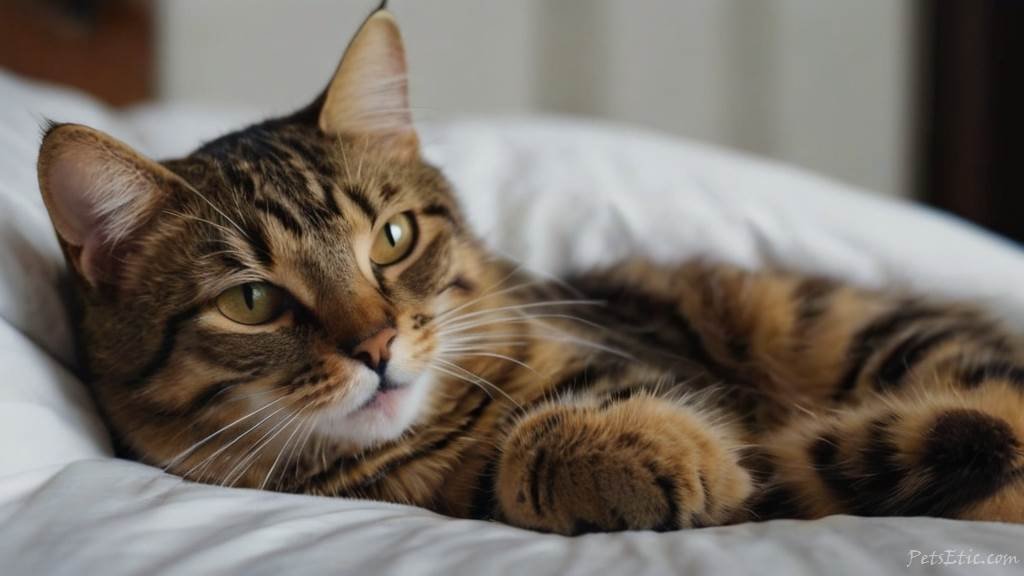
Why did my cat wake up growling?
Factors Contributing to Cats Waking Up in a Growling State
Ever found yourself startled awake by the sound of your cat growling in the middle of the night? It’s a puzzling sight, to say the least. But fear not, for there are several factors that could contribute to your feline friend waking up in a growling state.
-
Dream Disturbances: Cats, like humans, experience different stages of sleep, including the rapid eye movement (REM) phase where dreams occur. Just as nightmares can startle us awake, cats may also experience dream disturbances that trigger growling or other vocalizations upon waking. It’s their way of processing their dreams and reacting to perceived threats – real or imagined.
-
Environmental Factors: Your cat’s sleep environment plays a significant role in their overall sleep quality. Loud noises, sudden movements, or changes in temperature can disrupt your cat’s sleep and cause them to wake up in a state of agitation. Additionally, if your cat’s sleep area feels unsafe or uncomfortable, they may be more prone to growling upon waking as a defensive response.
-
Underlying Health Issues: Sometimes, growling upon waking can be a sign of underlying health issues that require attention. Pain or discomfort, such as arthritis or dental problems, can cause cats to wake up feeling irritable and vocalize their distress. Similarly, neurological disorders or hormonal imbalances may also contribute to abnormal sleep behavior in cats.
Understanding Potential Triggers for Post-Sleep Growling Episodes
Now that we’ve explored some of the factors contributing to cats waking up in a growling state, let’s take a closer look at the potential triggers for post-sleep growling episodes.
-
Stress and Anxiety: Cats are sensitive creatures, and changes in their environment or routine can cause stress and anxiety. If your cat is experiencing heightened levels of stress, they may be more likely to vocalize their discomfort upon waking. Common stressors for cats include moving to a new home, changes in their social hierarchy, or the addition of a new pet to the household.
-
Territorial Behavior: Cats are territorial animals, and they take their sleep space seriously. If your cat feels threatened or intruded upon while sleeping, they may react defensively upon waking. This could manifest as growling, hissing, or other aggressive behaviors aimed at asserting their dominance and protecting their territory.
-
Past Trauma: Cats, especially those with a history of trauma or abuse, may be more prone to sleep disturbances and growling episodes. Past experiences can leave a lasting impact on a cat’s psyche, causing them to be hyper-vigilant and reactive to perceived threats – even in their sleep.
In conclusion, while it may be alarming to witness your cat waking up in a growling state, it’s essential to understand the factors contributing to this behavior. By addressing any underlying issues and providing a safe and comfortable sleep environment, you can help ensure that your feline friend enjoys peaceful nights and restful sleep.

Why did my cat hiss in her sleep?
Exploring the Significance of Hissing During Feline Sleep
Have you ever witnessed your cat hissing in her sleep and wondered what could possibly be causing such a startling behavior? It’s a sight that can leave pet parents scratching their heads, but fear not – there may be more to your cat’s nighttime hissing than meets the eye.
-
Instinctual Response: Hissing is a common defensive behavior in cats, typically used to ward off perceived threats or assert dominance. While it’s more commonly observed when cats are awake and alert, some felines may continue to hiss in their sleep as a reflexive response to perceived dangers in their dreams. It’s their way of saying, “Back off, I’m not to be messed with!”
-
Dream Manifestations: Cats, like humans, experience different stages of sleep, including the rapid eye movement (REM) phase where dreams occur. During REM sleep, cats may exhibit a range of behaviors, from twitching whiskers to full-blown vocalizations like hissing. These dream-induced hissing episodes may be a manifestation of your cat’s subconscious fears or anxieties, playing out in the theater of their mind.
-
Stress and Anxiety: Cats are sensitive creatures, and stress and anxiety can manifest in various ways, including during sleep. If your cat is experiencing heightened levels of stress or anxiety, they may be more prone to hissing episodes during sleep as their subconscious processes these emotions. Common stressors for cats include changes in their environment, conflicts with other pets, or underlying health issues.
Potential Reasons Behind Hissing Episodes in Sleeping Cats
Now that we’ve explored the significance of hissing during feline sleep, let’s delve into some potential reasons behind these curious nighttime vocalizations.
-
Past Trauma: Cats, especially those with a history of trauma or abuse, may be more prone to hissing episodes during sleep. Past experiences can leave a lasting impact on a cat’s psyche, causing them to be hyper-vigilant and reactive to perceived threats – even in their dreams. If your cat exhibits frequent hissing during sleep, it may be worth considering whether they’ve experienced any past trauma that could be contributing to this behavior.
-
Underlying Health Issues: Hissing during sleep can also be a sign of underlying health issues that require attention. Pain or discomfort, such as dental problems or arthritis, may cause cats to vocalize in their sleep as they struggle to find relief. Additionally, neurological disorders or hormonal imbalances could also contribute to abnormal sleep behavior in cats.
In conclusion, while it may be unsettling to witness your cat hissing in her sleep, it’s essential to understand the potential reasons behind this behavior. By considering factors such as instinctual responses, dream manifestations, stress and anxiety, past trauma, and underlying health issues, you can better address any concerns and ensure the well-being of your feline friend.
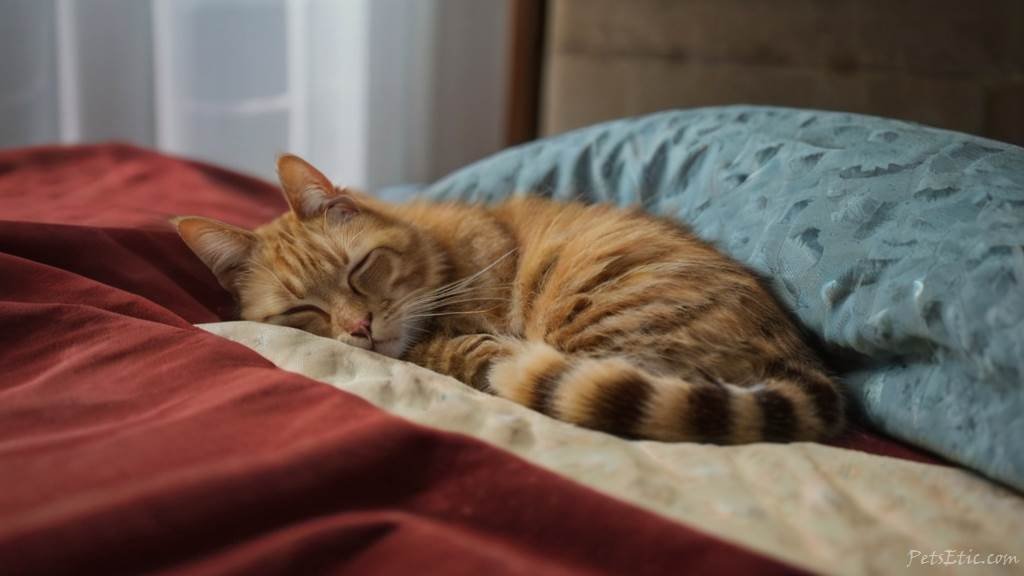
Is my cat having a nightmare?
Examining the Concept of Nightmares in Cats
Have you ever watched your cat sleep, only to see them twitching, pawing at the air, or even emitting soft mews or growls? It’s a common sight that can leave pet parents wondering – are cats capable of having nightmares?
-
Understanding Dreams in Cats: While we can’t ask our cats about their dreams, researchers believe that cats do experience sleep cycles similar to humans, including the rapid eye movement (REM) phase where dreams occur. During REM sleep, cats may exhibit behaviors that suggest they’re dreaming, such as twitching whiskers, kicking legs, or even vocalizing.
-
Dream Interpretation: While it’s tempting to anthropomorphize our pets and imagine them dreaming about chasing mice or lounging in the sun, the truth is that we can’t know for sure what our cats are dreaming about. However, it’s safe to assume that their dreams are influenced by their daily experiences, instincts, and past interactions with the world around them.
-
Emotional Responses: Cats are emotional creatures, capable of experiencing a wide range of emotions, from joy and contentment to fear and anxiety. It’s possible that cats may also experience nightmares – distressing dreams that leave them feeling scared or anxious upon waking. While we can’t know for certain if our cats are having nightmares, there are signs that may indicate they’re experiencing distressing dreams.
Signs Indicating a Cat May be Experiencing Distressing Dreams
So, how can you tell if your cat is having a nightmare? While we can’t peek into their dreams, there are some signs that may suggest your feline friend is experiencing distressing dreams.
-
Vocalizations: If you’ve ever heard your cat mewing, growling, or hissing in their sleep, it could be a sign that they’re experiencing a particularly vivid dream. These vocalizations may be accompanied by twitching or kicking movements, suggesting that your cat is reacting to something in their dream.
-
Restlessness: Cats experiencing nightmares may appear restless or agitated in their sleep, tossing and turning as if trying to escape from something. They may paw at the air or even thrash about, indicating that they’re feeling unsettled by whatever they’re experiencing in their dream.
-
Waking in a Startled State: Perhaps the most telling sign that your cat is having a nightmare is if they wake up suddenly in a startled state. They may bolt upright, their eyes wide with fear, before looking around frantically as if trying to make sense of their surroundings. Offering comfort and reassurance during these moments can help calm your cat and ease their distress.
In conclusion, while we can’t know for certain if cats are capable of having nightmares, there are signs that may suggest they’re experiencing distressing dreams. By understanding the concept of nightmares in cats and paying attention to their behavior during sleep, you can better support your feline friend and ensure they feel safe and secure, even in their dreams.
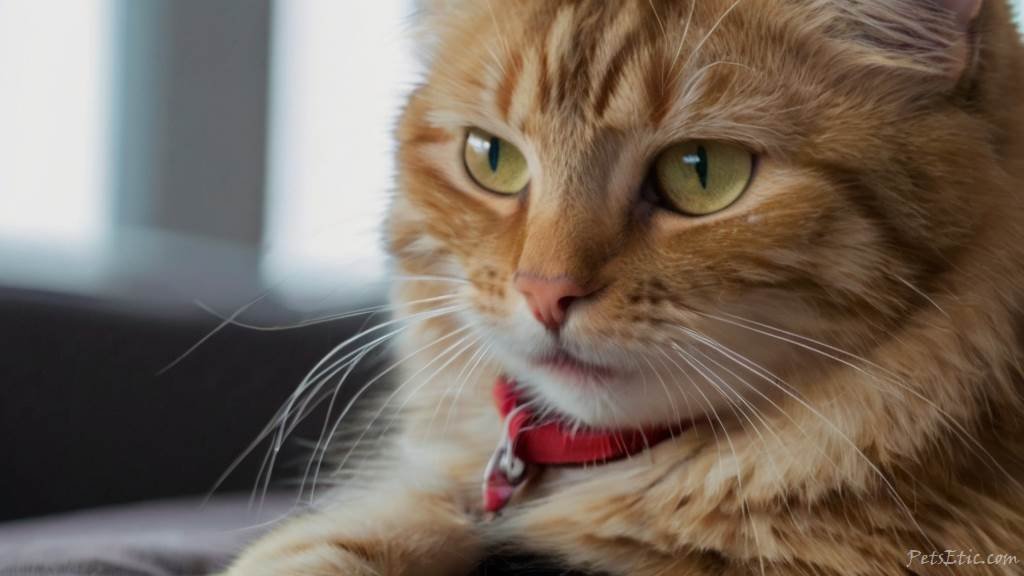
Recognizing Normal vs. Concerning Behavior
Differentiating Between Harmless Growling and Concerning Signs
When it comes to our feline friends, it’s essential to pay attention to their behaviors and understand what’s considered normal and what might be cause for concern. Let’s dive into how to differentiate between harmless growling and concerning signs in your cat’s behavior.
-
Normal Growling: Cats are complex creatures with a wide range of vocalizations, and the occasional growl during play or while sleeping is usually nothing to worry about. Normal growling may occur during rough-and-tumble play sessions with other pets or when your cat is feeling territorial over their food or favorite sleeping spot.
-
Harmless Vocalizations: In addition to growling, cats may vocalize in other ways that are completely harmless. From chirps and trills to meows and purrs, each sound carries its own meaning and can be a form of communication between your cat and their human or feline companions. As long as your cat’s vocalizations are not accompanied by signs of distress or aggression, they’re likely just expressing themselves in their own unique way.
-
Concerning Signs: On the other hand, there are some behaviors that may indicate underlying issues that require attention. If your cat’s growling is frequent, intense, or accompanied by other signs of distress, such as aggression, lethargy, or changes in appetite or litter box habits, it’s essential to investigate further to determine the cause.
When to Seek Veterinary Advice
While occasional growling may be normal for cats, there are certain situations where it’s best to seek veterinary advice to rule out any underlying health concerns or behavioral issues.
-
Persistent or Intense Growling: If your cat’s growling episodes become frequent, intense, or seem out of character, it’s essential to consult with your veterinarian to rule out any medical issues that may be causing discomfort or distress. Conditions such as dental problems, arthritis, or urinary tract infections can manifest as changes in behavior, including increased vocalization.
-
Changes in Behavior: Any significant changes in your cat’s behavior, including growling, should be taken seriously and investigated further. Cats are masters at hiding pain and discomfort, so it’s crucial to pay attention to subtle cues that may indicate something isn’t right. Your veterinarian can perform a thorough examination and recommend any necessary tests or treatments to address the underlying issue.
-
Behavioral Consultation: In some cases, growling may be a sign of underlying behavioral issues, such as anxiety or aggression. A veterinary behaviorist can help assess your cat’s behavior and develop a customized treatment plan to address any underlying issues and improve your cat’s overall well-being.
In conclusion, while occasional growling may be normal for cats, it’s essential to pay attention to your cat’s behavior and seek veterinary advice if you have any concerns. By understanding the difference between harmless growling and concerning signs and knowing when to seek help, you can ensure that your feline friend receives the care and attention they need to live a happy and healthy life.
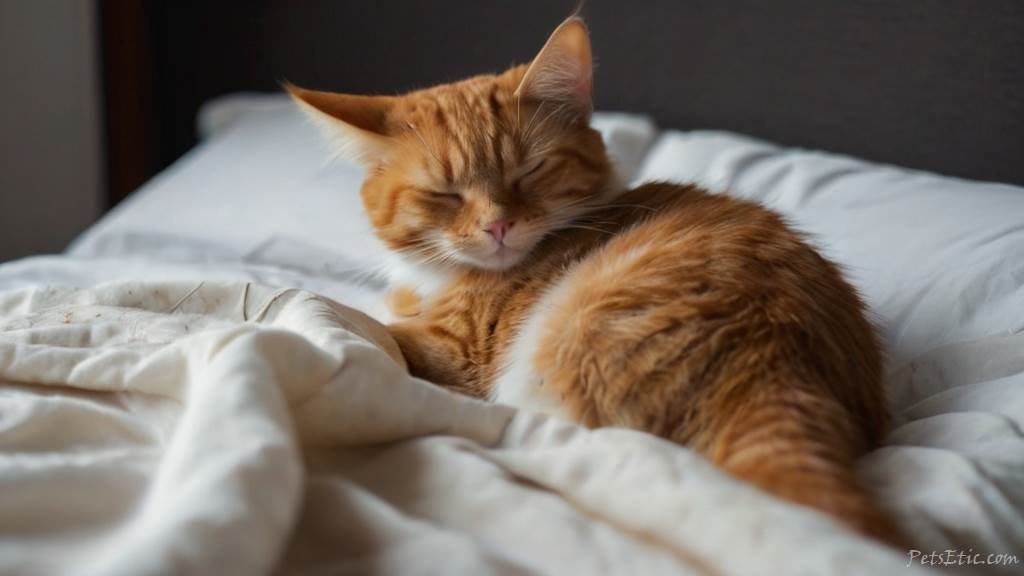
Tips for Managing Cat Growling in Sleep
Creating a Comfortable Sleeping Environment
Ah, the cozy corner of the couch, the plush cat bed by the window, or perhaps the warmth of your own bed – where your cat chooses to rest their sleepy head matters more than you might think! Here are some tips for creating a comfortable sleeping environment for your feline friend:
-
Choose the Right Bed: Cats are notorious for their love of soft, cozy spots to curl up and snooze. Invest in a comfortable cat bed that provides adequate support and cushioning for your cat’s joints and muscles. Whether they prefer a fluffy pillow-style bed or a snug cave-like hideout, make sure it’s large enough to accommodate their size and allows them to stretch out comfortably.
-
Location, Location, Location: Just like humans, cats have preferences when it comes to where they sleep. Some cats enjoy basking in the sun by a window, while others prefer a quiet corner away from the hustle and bustle of household activity. Observe your cat’s sleeping habits and choose a location that meets their needs for comfort and security.
-
Temperature Control: Cats are sensitive to changes in temperature, so it’s essential to keep their sleeping area comfortable year-round. Ensure adequate ventilation and airflow in warmer months and provide cozy blankets or heated beds during colder weather. Avoid placing your cat’s bed near drafty windows or heating vents, as extreme temperatures can disrupt their sleep and lead to discomfort.
Implementing Relaxation Techniques for Cats
We all need a little help unwinding after a long day, and cats are no exception! Here are some relaxation techniques to help your cat de-stress and enjoy restful sleep:
-
Gentle Massage: Just like humans, cats can benefit from a soothing massage to help release tension and promote relaxation. Use gentle, circular motions to massage your cat’s head, neck, and back, paying attention to any areas of tightness or discomfort. Many cats enjoy being stroked along their spine or under their chin, so experiment to find what works best for your furry friend.
-
Calming Scents: Aromatherapy isn’t just for humans – certain scents, such as lavender or chamomile, can have a calming effect on cats as well. Consider using a cat-safe essential oil diffuser or spritzing a calming spray in your cat’s sleeping area to create a relaxing atmosphere. Just be sure to choose products specifically formulated for cats and avoid overpowering scents that may be irritating or overwhelming.
-
Soft Music or White Noise: Background noise can help mask disruptive sounds and create a soothing environment for your cat to sleep. Consider playing soft music, nature sounds, or white noise in your cat’s sleeping area to drown out loud noises and promote relaxation. Just be sure to keep the volume low and choose music or sounds that are calming rather than stimulating.
In conclusion, by creating a comfortable sleeping environment and implementing relaxation techniques, you can help your cat enjoy restful sleep and reduce the likelihood of growling episodes during sleep. Remember to observe your cat’s behavior and preferences, and adjust their sleeping arrangements accordingly to ensure they feel safe, secure, and snuggly in dreamland.

